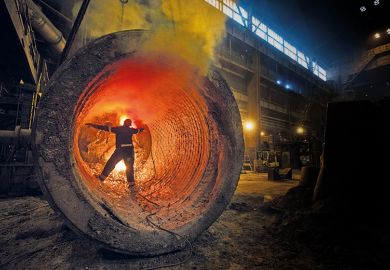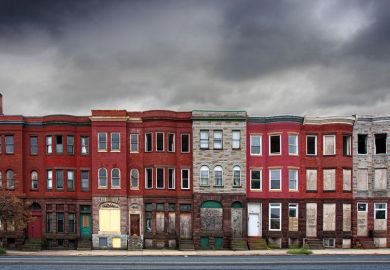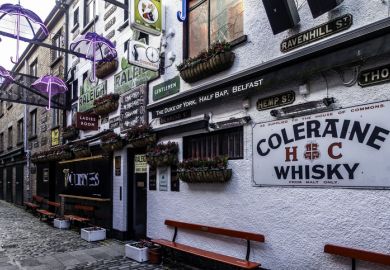I’d gone into a secondary school in Bradford to talk about the challenges facing our planet and the implications for future careers.
Talk turned quickly to dream jobs and that meant lots of aspiring footballers and social media celebrities. There was a notable exception, though: a quiet lad sitting at the back of the classroom who told me, in his strong Yorkshire accent, that he wanted to be an “asteroid miner”.
Lots of laughter around the class. But that is what we need now more than ever: people willing to dream and look beyond ordinary limitations.
Which is where higher education comes in. The pandemic period is an opportunity to close the divide between universities and their local communities, businesses and voluntary groups and to demonstrate to them the practical role, contribution and value of higher education. Most critically that means linking people to changing economic opportunities, as old doors close and new ones open in a post-pandemic world. Rather than being a means of delineating between the best and the rest, universities need to work within and across communities, and be taken seriously as genuine, hands-on partners with a focus on mission.
So how can senior academics turn themselves into visible, respected community leaders? How can they overcome some of the ingrained scepticism towards universities, the belief that they exist in their own bubbles, removed from everyday realities, slow and overly reflective?
In August, the city council appointed me chair of the Bradford Covid-19 Economic Recovery Board and gave me five months to assemble a board and deliver a strategy, ready for presentation and debate by elected officials at the council assembly in January 2021. With a population among the youngest of any city in Europe, Bradford has a lot of potential but also faces particular social issues – unemployment, crime and inequalities – that make economic recovery challenging but essential.
This is not the kind of role typically given to an academic. Leadership of economic planning for a city is more often given to one of the large consulting firms, influential local business leaders or an in-house council team. But, increasingly, it is diversity of thought, background, experience and approach that counts. Who wants the same old, same old, after all, when what is needed is distinctiveness and difference? My years as an award-winning business school dean and time working as a senior policy adviser in the Cabinet Office meant that I could bring to bear a mix of perspectives.
My experience of chairing the recovery board has also provided me with new insights into taking on a community-wide role. One major realisation was the immense value of higher education’s independence. I’ve been able to involve the chair of Tesco and vice-chair of the CBI, the chair of Yorkshire Building Society and the chief executive of a major charity to evaluate our work and recommendations. But the apolitical and non-commercial status of my academic position has also enabled me to bring together those groups working on behalf of communities who are less likely to be heard. And my experience of chairing countless meetings of highly opinionated academics has helped me steer them towards some sort of consensus.
My research background is also important. Support for the recovery strategy has been based on a recognition across the local authority, business and third-sector stakeholders of the quality and resilience of a methodological approach rooted in research. Rather than loading up Microsoft Project, this involves devising a tailored approach that fully stress-tests opinions, assumptions and emerging recommendations and encourages fresh perspectives, making use of a Delphi-style panel of experts alongside other evaluation methods where reflection and critique are valued.
Sometimes universities underestimate our links to the local region. But our role as major local employers and influencers gives us more contact points than other kinds of organisations. That gives us a strong understanding of local character and needs as well as a route of access and influence on behalf of community campaigns.
At Bradford, as well as seeding awareness of the career pathways opening up to young people, we have been taking part in industry centres of excellence in secondary schools to explore careers and listen to changing expectations, interests and concerns. We have also partnered with the council to keep more talented graduates in the city by facilitating early links with local employers, taking advantage of the government’s Kickstart Scheme, which provides funding to create new job placements for 16- to 24-year-olds on Universal Credit who are at risk of long-term unemployment.
Despite this prior engagement, it is still vital to make sure that all voices, from community groups to businesses, are heard when taking on a leadership role. That requires an appreciation of how different groups like to receive information and how they want to communicate their contribution, clocking verbal and non-verbal cues.
A commitment to delivery is also vital; nobody wants yet another strategy on the shelf. Building a visible role in the community means following through on projects, making sure that the thinking phases are only the start and there is a pathway to delivery. Local residents are watching.
University leaders should be open to questioning and accept that, ultimately, recommendations must be signed off by elected officials, via a vote in a public meeting. Time, however, is an issue that needs to be kept in mind. Everyone has competing priorities, so the time of board members must be respected and expectations kept realistic.
For us, the time commitment has been considerable, too. However, our mantra at the University of Bradford has been that what’s good for the city is good for the university, and vice versa. Taking on a community role on top of day-to-day responsibilities may seem onerous, but it is critical for the profile and positioning of universities. We must show that we deliver impact that changes lives.
Zahir Irani is deputy vice-chancellor at University of Bradford and chair of the Bradford Economic Recovery Board, run by Bradford Metropolitan District Council.
Register to continue
Why register?
- Registration is free and only takes a moment
- Once registered, you can read 3 articles a month
- Sign up for our newsletter
Subscribe
Or subscribe for unlimited access to:
- Unlimited access to news, views, insights & reviews
- Digital editions
- Digital access to THE’s university and college rankings analysis
Already registered or a current subscriber?









